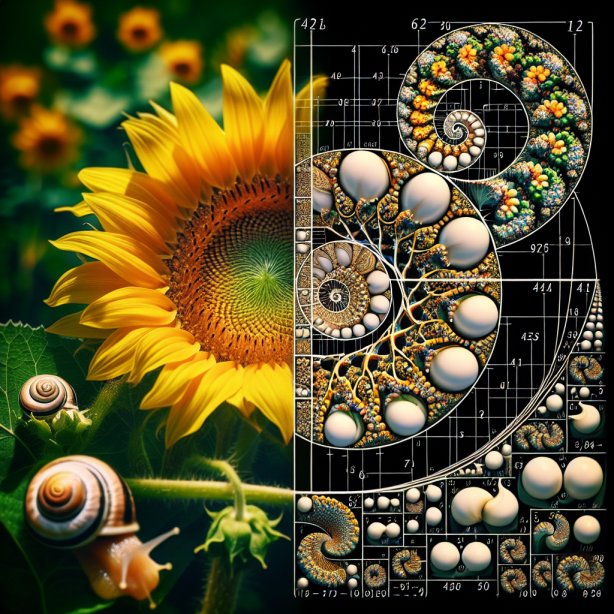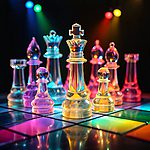Fibonacci Sequence in Real Life: Unlocking Nature’s Hidden Secrets
Dec 21, 2024
The Fibonacci sequence, a series of numbers where each number is the sum of the two preceding ones (0, 1, 1, 2, 3, 5, 8, 13, 21, 34, …), has fascinated mathematicians, scientists, and artists for centuries. This seemingly simple sequence reveals a hidden code in numerous natural phenomena, from the arrangement of leaves on a plant to the spiral structures of galaxies. As we delve into the mysteries of these numbers, we uncover their profound connection to the Golden Ratio, Platonic solids, the Flower of Life, and the very fabric of the universe.
The Fibonacci Sequence and the Golden Ratio: A Behavioral Psychology Perspective
The Bandwagon Effect in Mathematical Appreciation
The widespread fascination with the Fibonacci sequence and the Golden Ratio can be partly attributed to the bandwagon effect. As these mathematical concepts gained popularity in art, architecture, and nature studies, more people jumped on the bandwagon of appreciating their significance. This collective admiration has led to a self-reinforcing cycle where the perceived importance of these concepts grows, sometimes beyond their actual mathematical relevance.
The Presence of Fibonacci in Nature: Cognitive Biases at Play
When examining the presence of Fibonacci numbers and the Golden Ratio in nature, we must be cautious of confirmation bias. Researchers and enthusiasts might unconsciously seek examples that confirm these patterns’ prevalence while overlooking instances that don’t fit. This cognitive bias can lead to overestimating how frequently these mathematical concepts genuinely appear in the natural world.
The widespread acceptance of Fibonacci patterns in nature demonstrates a form of herd mentality within scientific communities. As more researchers publish findings supporting these patterns, others may feel compelled to follow suit, potentially overlooking alternative explanations or patterns that don’t conform to the Fibonacci sequence.
Fibonacci in Human Proportions: The Lemming Effect
The belief that human body proportions adhere to the Golden Ratio showcases the lemming effect. Once this idea gained traction, it spread rapidly, with people eagerly accepting and propagating it without critical evaluation. This collective behaviour resembles lemmings following each other, even if the path leads to questionable conclusions.
The pervasive use of the Golden Ratio in art and design illustrates how mob psychology can influence creative fields. As the concept gained popularity, it became a standard that artists and designers felt compelled to follow, sometimes at the expense of individual creativity or alternative aesthetic principles.
While the Fibonacci sequence and Golden Ratio undoubtedly hold mathematical and aesthetic value, it’s crucial to approach their perceived omnipresence with a critical eye. By recognizing the influence of cognitive biases and group behaviours, we can appreciate these concepts for their genuine merits while avoiding the pitfalls of uncritical acceptance or overestimation of their significance in nature and human aesthetics.
The Mysteries of the Fibonacci Sequence
The mysteries of the Fibonacci sequence extend beyond its presence in nature. This sequence encodes the universe’s deeper order and harmony with its simple recursive formula. One of the most intriguing aspects of the Fibonacci sequence is its connection to the Golden Ratio. As the sequence progresses, the ratio of successive Fibonacci numbers converges to the Golden Ratio, a value that appears in various natural and man-made structures.
The golden ratio, also known as phi (φ), is often considered the most aesthetically pleasing proportion. It has been used in art, architecture, and design for centuries, from the Parthenon in ancient Greece to the works of Leonardo da Vinci. The presence of the golden ratio in the Fibonacci sequence suggests that this mathematical relationship is not just a human invention but a fundamental characteristic of the natural world.
The Hidden Connection to Platonic Solids and the Flower of Life
The Fibonacci sequence and the Golden Ratio are closely related to the Platonic solids and the Flower of Life. Platonic solids, named after the ancient Greek philosopher Plato, are highly symmetrical three-dimensional shapes foundational in the study of geometry. There are five Platonic solids: the tetrahedron, cube, octahedron, dodecahedron, and icosahedron. These shapes are unique in that each face is identical, each vertex has the same number of faces meeting, and the angles between faces are the same.
The Flower of Life is a geometric figure composed of multiple evenly-spaced, overlapping circles arranged in a flower-like pattern with six-fold symmetry. This pattern is considered sacred in many cultures and is believed to represent the cycle of creation and the interconnectedness of all life. The Flower of Life contains the blueprint for Metatron’s Cube, a complex geometric figure that holds all five Platonic solids. By drawing straight lines between the centres of the circles in the Flower of Life, one can derive Metatron’s Cube, which reveals the hidden connection between these geometric forms.
The Fibonacci sequence and the Golden Ratio in the Platonic solids and the Flower of Life further reinforce the idea that these geometric forms are coincidental and part of a deeper mathematical and cosmic order. This connection also highlights the universality of these patterns, as they appear in various aspects of nature, from the arrangement of leaves on a plant to the spiral structure of galaxies.
Foundations of Our Fabric and the Holographic Universe
The interconnectedness of the Fibonacci sequence, Platonic solids, and the Flower of Life suggests that they could be foundational to the very fabric of our reality. This notion aligns with the concept of the holographic universe, a theory suggesting that the entire universe can be seen as a two-dimensional information structure “painted” on the cosmological horizon, with the three-dimensional reality we perceive as a projection of this information.
The geometric codes embedded within this holographic fabric are the Fibonacci sequence and the Golden Ratio. Just as a hologram contains all the information needed to recreate the whole image in every part, these geometric patterns might encode the fundamental principles of the universe in every fragment of space and matter. This idea resonates with the ancient belief in the sacredness of geometry, where understanding these shapes and patterns could unlock the secrets of the cosmos.
The Quantum Connection
The field of quantum physics further supports this idea, revealing a world where particles and waves are interconnected in ways that defy classical understanding. The principles of quantum entanglement and superposition suggest that, at a fundamental level, everything in the universe is interconnected, much like the overlapping circles in the Flower of Life.
Quantum physicists have also explored the geometric nature of space-time itself, with concepts like string theory and loop quantum gravity proposing that the fabric of the universe is woven from tiny, vibrating strings or loops. These theories often involve complex geometric shapes and higher-dimensional spaces, echoing the significance of the Fibonacci sequence, Platonic solids, and the Flower of Life in describing the structure of reality.
The Spiritual Dimension
The connection between the Fibonacci sequence, Platonic solids, the Flower of Life, and the universe’s fundamental structure extends into spirituality. Many ancient cultures and spiritual traditions have revered these geometric forms as sacred symbols, embodying the principles of creation, harmony, and balance.
In sacred geometry, these shapes and patterns are seen as the language of the divine, a way to understand the underlying order and intelligence of the cosmos. Meditating on these forms, visualizing their structures, and incorporating them into art and architecture are ways to align oneself with the greater harmony of the universe.
The Fibonacci sequence, with its inherent connection to the Golden Ratio, Platonic solids, and the Flower of Life, bridges the mathematical, physical, and spiritual realms. It invites us to see the world through the lens of interconnectedness and to recognize the sacred geometry that underlies all creation.
Conclusion
The Fibonacci sequence is more than a simple series of numbers; it is a code that reveals the deeper order and harmony of the universe. Its connection to the Golden Ratio, Platonic solids, and the Flower of Life underscores its significance in the natural world and human creativity. As we explore the mysteries of these numbers, we uncover their profound influence on the structure of reality, from the smallest particles to the vastness of the cosmos.
The presence of the Fibonacci sequence and the Golden Ratio in nature, art, and architecture suggests that these patterns are not merely coincidental but are fundamental principles of the universe. They offer a blueprint for understanding the interconnectedness of all things, aligning with the concept of the holographic universe and the principles of quantum physics.
Ultimately, the Fibonacci sequence serves as a reminder of the beauty and intelligence inherent in the natural world. It invites us to explore the hidden connections that bind the universe together and to appreciate the intricate patterns that shape our reality. Whether through the study of mathematics, the contemplation of sacred geometry, or the exploration of the quantum realm, we are encouraged to recognize the profound harmony that underlies all creation and to see the world as a reflection of nature’s code.











